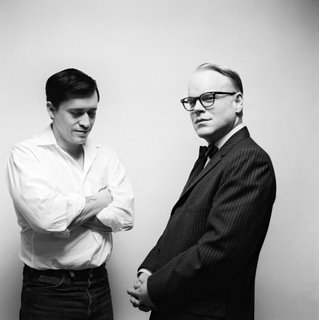
This is a film about one of the dubious personalities in the art field of the 20th century. Truman Capote managed to write one of the most dramatic boos taking advantage of people and wishing for their execution.
The spectators follow this conflicitve personality through the creation of the whole book. From the start when Capote first got interested in the killings untill the end, the execution of the killers by hanging. Capote sometimes seems to really care for the men that did the atrocious crime trying to find them proper lawyers to defend them and talking to the for hours. Other times he lies to them in order to get the material he desires for his book and wishes they are executed in order to be able to finish his masterpiace. In the end the killers are killed by the state and Capote manages to write one of the most sucessfull books of our era.
The film is well made. The spectator can easily watch it and enjoy. Hoffman manages to convey the special traits of the character he impersonates. Capote was a homosexual, insecure person with plenty of personal problems. Hoffman through hiws way of talking and facial movments proves he studied his hero well and managed to imitate it faithfully. In the whole, however, the film is mediocre, since it has nothing new or ecxeptional to offer.
Eventually, the film raises a question. An artist, a writer always gets his inspiration from the lives of other people. In some way, exploits their feelings and experiences in order to create something great, a piece of art. In Capote's case this expoitation is explicit while in most cases the spectators do not realise it.Up to what a point is this expoitation justyfiable?